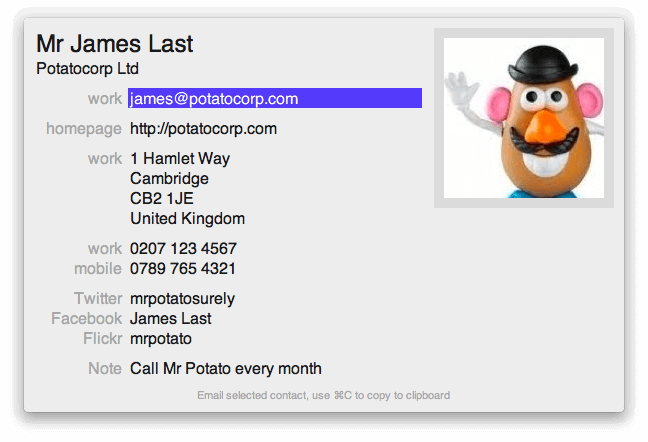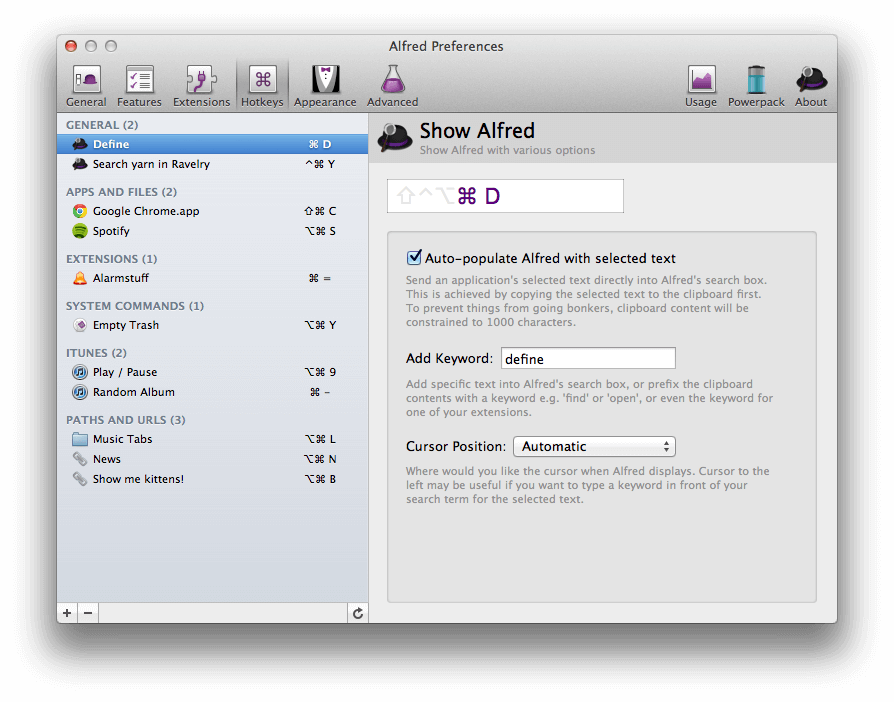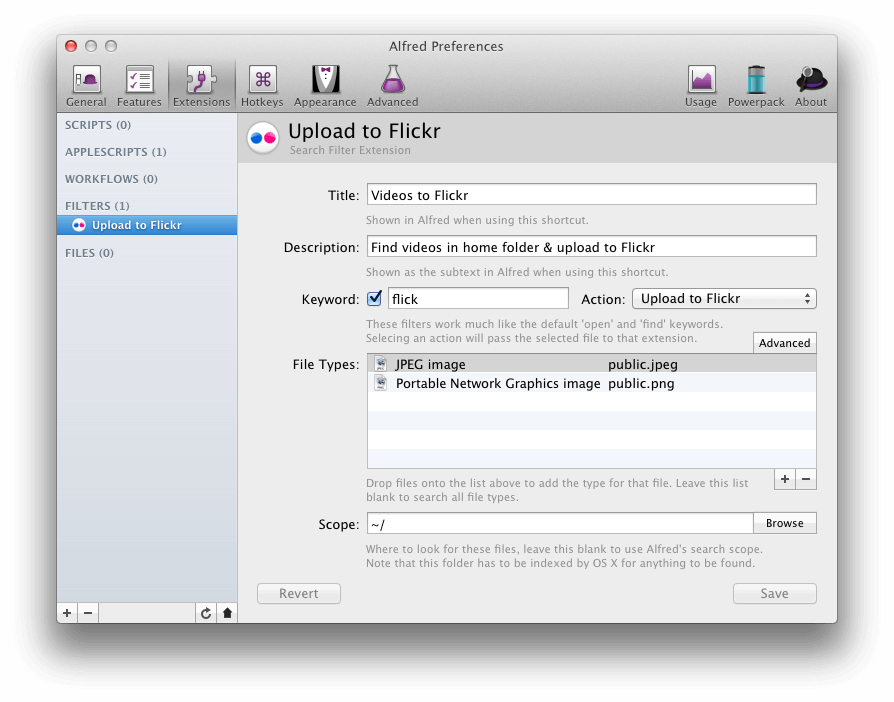
This week, Alfred celebrates his second birthday. And he likes to do it in style!
Hot on the heels of two big releases, we're offering a 10% discount on the Powerpack so if you haven't yet adopted the powerful add-on to Alfred's free version yet, this is your chance. With more useful features than a Swiss Army knife, you're bound to love this addition to your everyday Mac workflow.
If you're already a Powerpack user, be sure to tell your friends to take advantage of this week's birthday discount code while it lasts! You have until Saturday 3rd March to grab a single or family license at 10% discount.
Also, feel free to bake Alfred a birthday cake, cupcakes or cookies. We lo... ahem, I mean, he loves those very much.
Today, Alfred 1.1 is available on auto-update for non-Mac App Store users with lots of new goodies for you!
This release brings some great feature improvements to Address Book, Hotkeys and Extensions:
- In the Address Book contact viewer, take action on contacts' details. For example, dial their number or view their online profiles
- Select text in any app & open Alfred to take action on it with a hotkey
- Set default actions on filter extensions, like uploading a file to Flickr automatically
- Replace existing Powerpack extensions easily when updates are released
- Many more improvements and tweaks to make your Alfred experience even better.
Find out more about these features below, or have a look at the change log for the full list of features, improvements and bug fixes.
A Bit More About Address Book
The Address Book integration has received a lot of love and improvement in the latest release. With the Contact Viewer enabled (go to Preferences > Features > Address Book) you can now view notes as well as your messaging and social information for each contact right within Alfred. All this information is within easy reach, just a few keyboard presses away, and not just sitting there idly either because you can take action on what you see.

For example, you can ask Alfred to dial the phone number of your contact using Skype, or to pop up their Flickr profile based on their username. This is highly flexible as you can use a URL scheme or extension to do more with your contact's information.
Send Selected Text to Alfred
Got some text you want to take action on in Alfred? You can now create your own global hotkeys to send the text to Alfred. The best bit? You can prefix it with a keyword if you want to save yourself some typing. For example, I've set a hotkey (Cmd + D) to pop up Alfred with the text I've selected and the keyword "define" prefixed.

Get creative and use the keyword for your extensions to launch searches for your favourite sites, developer resources and more!
Set Default Actions for Filter Extensions
If you're already familiar with the Filter extensions, you'll know that by setting a filter, you can look for specific file types by using the keyword. And now, you can set a default action for these.
Open the image in Fireworks, upload the video to Vimeo or add the file to your to-do list... It allows you to improve your workflow by using extensions or scripts to set a custom action on the selected files.

And more...
Check out the full change log for all of the new features, improvements and bug fixes.
What about Mac App Store users?
As version 1.1 primarily consists of changes to the Powerpack, and the current Mac App Store version (1.0) is fully stable, this latest release won't be available in the Mac App Store. You can always download the latest version from our website.
In the next few days, I'll publish some examples of what you can do with both the Address Book and Filter Action features, including some hand-picked extensions you can download to improve your workflow!
Enjoy the latest features :)
Cheers,
Vero
On November 29th, we released version 1.0 of Alfred. We were so excited to finally make this milestone release available to everyone, yet we couldn't have predicted how much better you would all make December and January for us.

Since the release, Alfred received numerous accolades, including the revered Macworld Editor's Choice Award. As a Mac user since the late 80's, I remember thumbing through my grandfather's Macworld magazines, so being recognised as an "exceptional Mac product" by this mainstay of the Mac industry is an honour. Plus, it comes with a gigantic statue. Who doesn't love a giant statue?
Additionally, a few other publications awarded Alfred recognition as they looked back at 2011:
In addition, at the end of the year, screencaster extraordinaire Don McAllister produced two excellent videos on Alfred's core and Powerpack features. If you're trying to convince a friend to switch to Alfred, this video will walk them through in superbly useful detail.
With these being the cherry on top of our 2011, Christmas was spent sitting on cloud nine and feeling that we truly do have the best community in the world.
Since 2012 started, Alfred also received a mention on Forbes and a PCMag Editor's Choice review. As they say, start the year as you mean to go on! We've saved as many of the mentions as possible in our Delicious account, so have a browse if you're curious. And of course, thanks to everyone who wrote these wonderful pieces.
What now?
Did you really think that now that Alfred has hit 1.0, we'd stop improving this app we love so much? Of course not - you know us too well! :)
Andrew has nearly finished working on version 1.1. As he explains on his Tumblr, it originally was intended to be a 1.0.1 maintenance release, with a few tiny fixes, but it has grown into a full blown release with shiny new features. Expect to see improvements to Contacts integration and Extensions, and see the change log for the full list of changes. As it went into development release today, we hope to roll it out to everyone within the next few weeks.
We also can't wait to unveil the other ideas we've been working on, which we hope to share with you over the course of the year. Until then, keep an eye on Twitter for sneak previews over the coming months!
Cheers,
Vero
2011 - How was it for you? For us, it was... epic, in the truest sense. It was a long adventure, filled with fantastic twists and turns and a glorious ending.
Not only have we made tons of new friends, learned loads more about business, but we have been awarded incredible recognition; We were graced with a Macworld's Editor's Choice Award, as TUAW's Best Mac Utility of 2011, one of MacLife's Top 10 Must-Have Apps of 2011, one of Mashable's 10 Best Mac Apps of 2011 and have been nominated for MacStories and Cult of Mac's awards, to be announced soon.
To each and every one of you, thank you for the support you've given us. Even if all you've done is told one friend about Alfred, you've helped one more person become more efficient when using their Mac. Thank you for the supportive tweets, the hilarious cat and cheeseburger pictures you've emailed us and the sock-blowingly brilliant extensions you've taken the time to create.
We wish you a relaxing, fun-filled Christmas, complete with great friends and great food. It's a chance to take a break from the everyday, look back onto last year and look forward to the new year ahead.
2011 rocked and we're coming back for seconds. Roll on 2012!
Cheers,
Andrew & Vero

Over the course of December, we've been giving away all sorts of tips and goodies for you to enjoy as part of our Christmas Calendar. Today, we've decided to give differently.
The greatest thing we all have to be grateful for is our health, which gives us the freedom to do what we want and live the life we want. We can now live longer and healthier than ever before. However, cancer is a vicious illness which can affect our loved ones much too easily. My cousin suffered from leukaemia in her teens but came out healthy and strong, and MacStories' Viticci is fighting his own battle, as he shared recently.
Unfortunately, there is still much we don't understand about cancer and some, like Steve Jobs, don't necessarily win their fight.
We will be donating £1000 to Cancer Research UK this Christmas, hoping that together we can make a difference.







